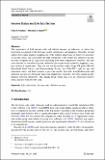Files in this item
Income status and life satisfaction
Item metadata
| dc.contributor.author | FitzRoy, Felix R. | |
| dc.contributor.author | Nolan, Michael A. | |
| dc.date.accessioned | 2021-05-13T10:30:03Z | |
| dc.date.available | 2021-05-13T10:30:03Z | |
| dc.date.issued | 2021-05-11 | |
| dc.identifier | 274197037 | |
| dc.identifier | ceae8112-a891-4857-b68b-488543455979 | |
| dc.identifier | 85105914963 | |
| dc.identifier | 000649454500001 | |
| dc.identifier.citation | FitzRoy , F R & Nolan , M A 2021 , ' Income status and life satisfaction ' , Journal of Happiness Studies , vol. First Online . https://doi.org/10.1007/s10902-021-00397-y | en |
| dc.identifier.issn | 1573-7780 | |
| dc.identifier.other | RIS: urn:6832656D1C03805134F9C9177BA49014 | |
| dc.identifier.other | RIS: FitzRoy2021 | |
| dc.identifier.uri | https://hdl.handle.net/10023/23175 | |
| dc.description.abstract | The importance of both income rank and relative income, as indicators of status, has long been recognised in the literature on life satisfaction and happiness. Recently, several authors have made explicit comparisons of the relative importance of these two measures of income status, and concluded that rank dominates to the extent that reference income becomes insignificant in regressions including both these explanatory variables, and that even absolute or household income, otherwise always positively related to happiness, may lose statistical significance. Here we test this hypothesis with a large UK panel (British Household Panel Survey and Understanding Society) for 1996–2017, split by age and retirement status, and find, contrary to previous results, that rank, household income and reference income are all usually important explanatory variables, but with significant differences between subgroups. This finding holds when rank is in its often-used relative form, and also with absolute rank. | |
| dc.format.extent | 24 | |
| dc.format.extent | 631443 | |
| dc.language.iso | eng | |
| dc.relation.ispartof | Journal of Happiness Studies | en |
| dc.subject | Life satisfaction | en |
| dc.subject | Income rank | en |
| dc.subject | Relative income | en |
| dc.subject | HB Economic Theory | en |
| dc.subject | 3rd-DAS | en |
| dc.subject.lcc | HB | en |
| dc.title | Income status and life satisfaction | en |
| dc.type | Journal article | en |
| dc.contributor.institution | University of St Andrews. School of Economics and Finance | en |
| dc.identifier.doi | 10.1007/s10902-021-00397-y | |
| dc.description.status | Peer reviewed | en |
This item appears in the following Collection(s)
Items in the St Andrews Research Repository are protected by copyright, with all rights reserved, unless otherwise indicated.

